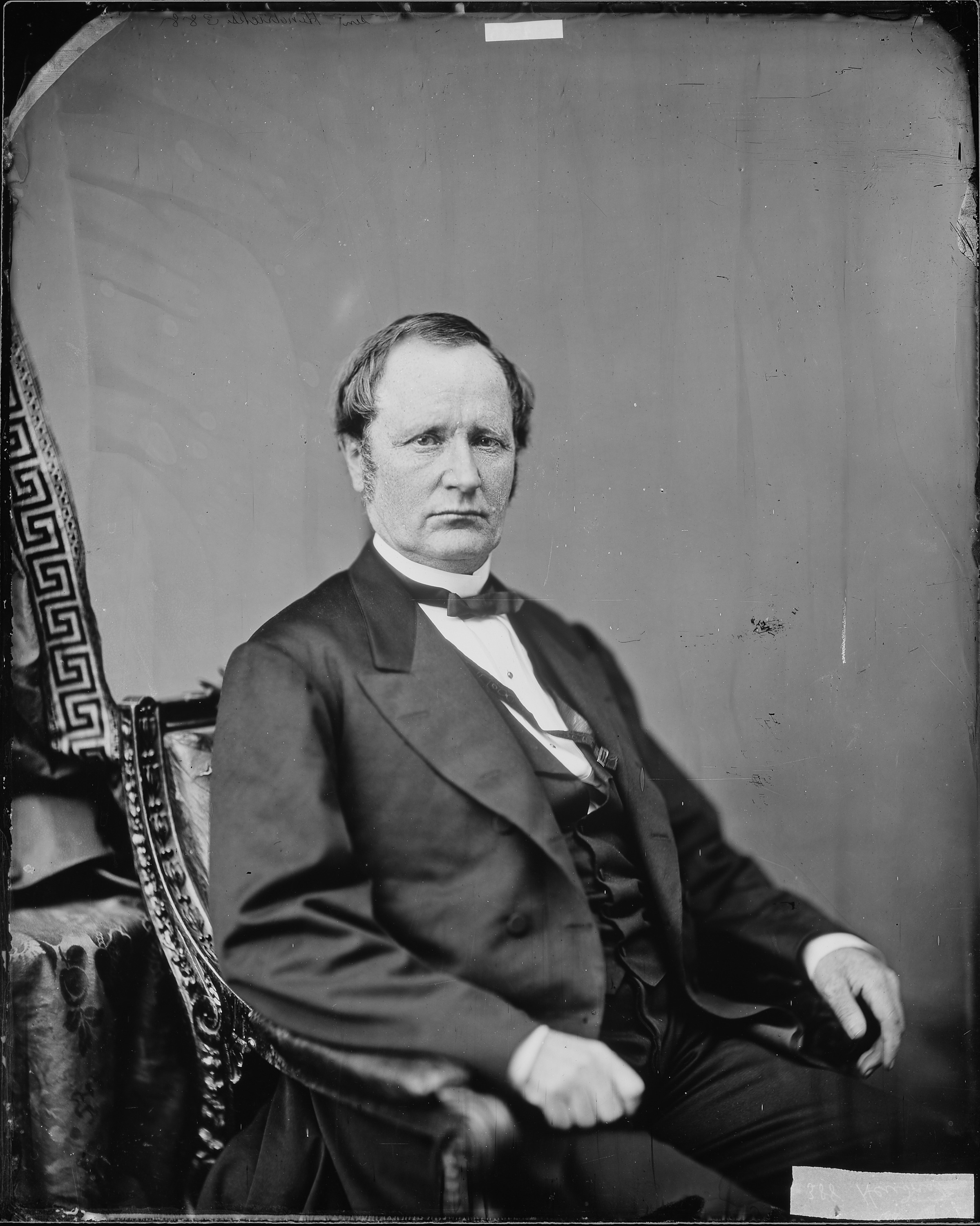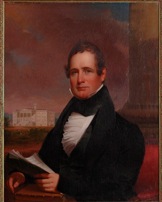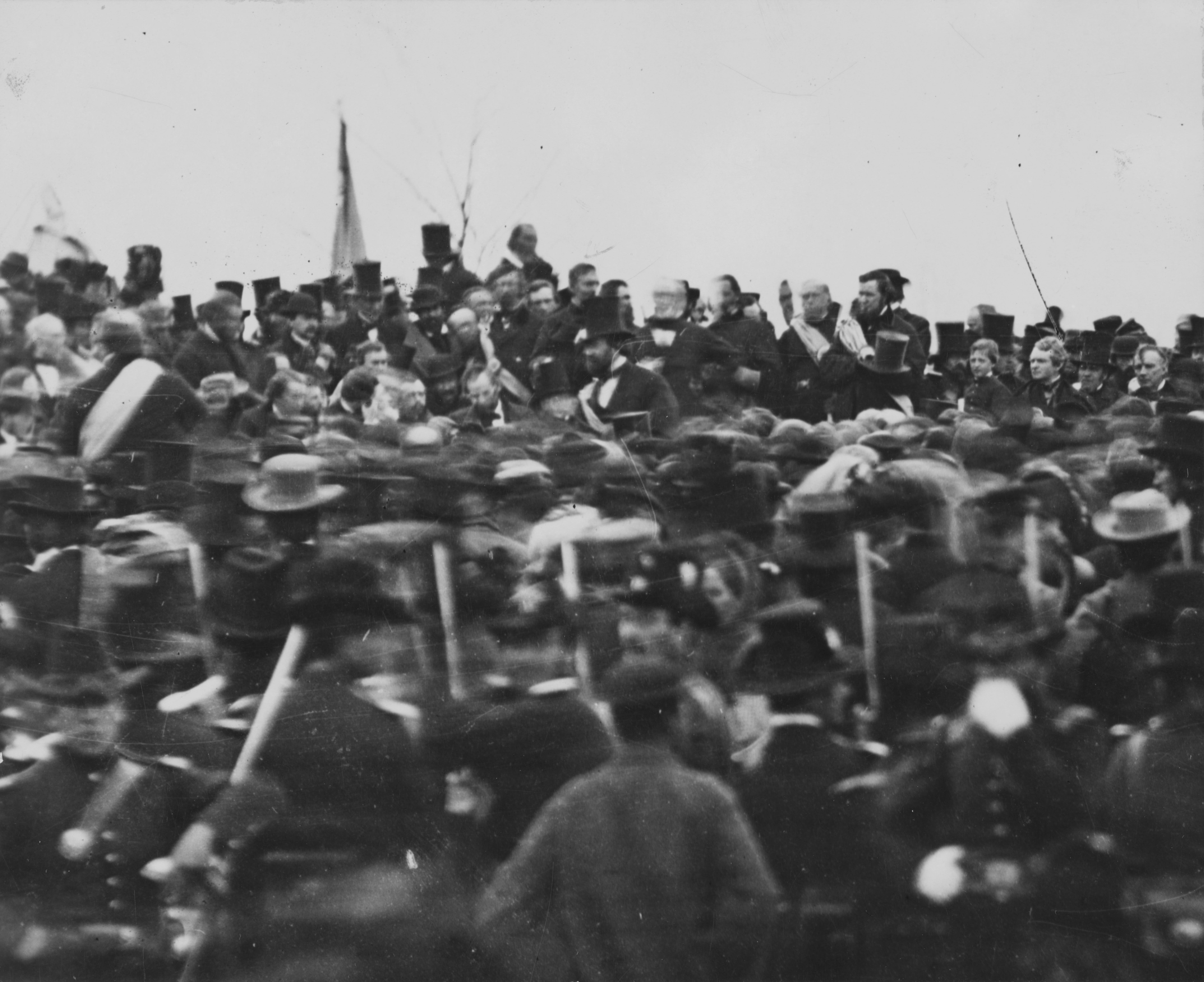|
Conrad Baker
Conrad Baker (February 12, 1817 – April 28, 1885) was an American attorney, military officer, and politician who served as state representative, 15th lieutenant governor, and the 15th governor of the U.S. state of Indiana from 1867 to 1873. Baker had served in the Union Army during the American Civil War, rising to the rank of colonel, but resigned following his election as lieutenant governor, during which time he played an important role in overseeing the formation and training of states levies. He served as acting-governor for five months during the illness of Governor Oliver Morton, and was elevated to Governor following Morton's resignation from office. During Baker's full term as governor, he focused primitively on the creation and improvement of institutions to help veterans and their families that had been disaffected by the war. He also championed the post-war federal constitutional amendments, and was able to successfully advocate their acceptance. Early life Famil ... [...More Info...] [...Related Items...] OR: [Wikipedia] [Google] [Baidu] |
Will Cumback
William Cumback (March 24, 1829 – July 31, 1905) was an American lawyer and Civil War veteran who served one term as a U.S. Representative from Indiana from 1855 to 1857. Biography Born near Mount Carmel, Indiana, Cumback attended the common schools and was graduated from Miami University, Oxford, Ohio. He taught school two years. He studied law at the Cincinnati Law School. He was admitted to the bar and commenced practice in Greensburg, Indiana, in 1853. Congress Cumback was elected as an Indiana People's Party candidate to the Thirty-fourth Congress (March 4, 1855 – March 3, 1857). He was an unsuccessful candidate for reelection in 1856. He resumed the practice of law. Civil War He was appointed a paymaster in the Army and served throughout the Civil War. He served as member of the State senate in 1866. The 16th Lieutenant Governor of Indiana in 1868. Later career and death He was an unsuccessful candidate for election to the United States Senate in 1869. P ... [...More Info...] [...Related Items...] OR: [Wikipedia] [Google] [Baidu] |
Union (ACW)
During the American Civil War, the Union, also known as the North, referred to the United States led by President Abraham Lincoln. It was opposed by the secessionist Confederate States of America (CSA), informally called "the Confederacy" or "the South". The Union is named after its declared goal of preserving the United States as a constitutional union. "Union" is used in the U.S. Constitution to refer to the founding formation of the people, and to the states in union. In the context of the Civil War, it has also often been used as a synonym for "the northern states loyal to the United States government;" in this meaning, the Union consisted of 20 free states and five border states. The Union Army was a new formation comprising mostly state units, together with units from the regular U.S. Army. The border states were essential as a supply base for the Union invasion of the Confederacy, and Lincoln realized he could not win the war without control of them, especially Maryla ... [...More Info...] [...Related Items...] OR: [Wikipedia] [Google] [Baidu] |
Terre Haute
Terre Haute ( ) is a city in and the county seat of Vigo County, Indiana, United States, about 5 miles east of the state's western border with Illinois. As of the 2010 census, the city had a population of 60,785 and its metropolitan area had a population of 170,943. Located along the Wabash River, Terre Haute is one of the largest cities in the Wabash Valley and is known as the Queen City of the Wabash. The city is home to multiple higher-education institutions, including Indiana State University, Rose-Hulman Institute of Technology, and Ivy Tech Community College of Indiana. History Terre Haute's name is derived from the French phrase ''terre haute'' (pronounced in French), meaning "highland". It was named by French-Canadian explorers and fur trappers to the area in the early 18th century to describe the unique location above the Wabash River (see French colonization of the Americas). At the time, the area was claimed by the French and British and these highlands were consid ... [...More Info...] [...Related Items...] OR: [Wikipedia] [Google] [Baidu] |
Indiana State University
Indiana State University (ISU) is a public university in Terre Haute, Indiana. It was founded in 1865 and offers over 100 undergraduate majors and more than 75 graduate and professional programs. Indiana State is classified among "D/PU: Doctoral/Professional Universities". History A seminary building was constructed and later used for Vigo Collegiate Institute. After several years the school closed and the property sold to be part of a public institution of education. It is now part of the Indiana State University campus. Indiana State University was established by the Indiana General Assembly on December 20, 1865, as the Indiana State Normal School in Terre Haute. It's location in Terre Haute was secured by a donation of $73,000 by Chauncey Rose. As the State Normal School, its core mission was to educate elementary and high school teachers. The school awarded its first baccalaureate degrees in 1908 and the first master's degrees in 1928. In 1929, the Indiana State Normal ... [...More Info...] [...Related Items...] OR: [Wikipedia] [Google] [Baidu] |
Thomas Hendricks
Thomas Andrews Hendricks (September 7, 1819November 25, 1885) was an American politician and lawyer from Indiana who served as the 16th governor of Indiana from 1873 to 1877 and the 21st vice president of the United States from March until his death in November 1885. Hendricks represented Indiana in the U.S. House of Representatives (1851–1855) and the U.S. Senate (1863–1869). He also represented Shelby County, Indiana, in the Indiana General Assembly (1848–1850) and as a delegate to the 1851 Indiana constitutional convention. In addition, Hendricks served as commissioner of the General Land Office (1855–1859). Hendricks, a popular member of the Democratic Party, was a fiscal conservative. He defended the Democratic position in the U.S. Senate during the American Civil War and Reconstruction era and voted against the Thirteenth, Fourteenth, and Fifteenth Amendments to the U.S. Constitution. He also opposed Radical Reconstruction and President of the United States, P ... [...More Info...] [...Related Items...] OR: [Wikipedia] [Google] [Baidu] |
Indianapolis
Indianapolis (), colloquially known as Indy, is the state capital and most populous city of the U.S. state of Indiana and the seat of Marion County. According to the U.S. Census Bureau, the consolidated population of Indianapolis and Marion County was 977,203 in 2020. The "balance" population, which excludes semi-autonomous municipalities in Marion County, was 887,642. It is the 15th most populous city in the U.S., the third-most populous city in the Midwest, after Chicago and Columbus, Ohio, and the fourth-most populous state capital after Phoenix, Arizona, Austin, Texas, and Columbus. The Indianapolis metropolitan area is the 33rd most populous metropolitan statistical area in the U.S., with 2,111,040 residents. Its combined statistical area ranks 28th, with a population of 2,431,361. Indianapolis covers , making it the 18th largest city by land area in the U.S. Indigenous peoples inhabited the area dating to as early as 10,000 BC. In 1818, the Lenape relinquished their ... [...More Info...] [...Related Items...] OR: [Wikipedia] [Google] [Baidu] |
1st Regiment Indiana Cavalry
First or 1st is the ordinal form of the number one (#1). First or 1st may also refer to: *World record, specifically the first instance of a particular achievement Arts and media Music * 1$T, American rapper, singer-songwriter, DJ, and record producer Albums * ''1st'' (album), a 1983 album by Streets * ''1st'' (Rasmus EP), a 1995 EP by The Rasmus, frequently identified as a single * '' 1ST'', a 2021 album by SixTones * ''First'' (Baroness EP), an EP by Baroness * ''First'' (Ferlyn G EP), an EP by Ferlyn G * ''First'' (David Gates album), an album by David Gates * ''First'' (O'Bryan album), an album by O'Bryan * ''First'' (Raymond Lam album), an album by Raymond Lam * ''First'', an album by Denise Ho Songs * "First" (Cold War Kids song), a song by Cold War Kids * "First" (Lindsay Lohan song), a song by Lindsay Lohan * "First", a song by Everglow from ''Last Melody'' * "First", a song by Lauren Daigle * "First", a song by Niki & Gabi * "First", a song by Jonas Brot ... [...More Info...] [...Related Items...] OR: [Wikipedia] [Google] [Baidu] |
William Baker (Pennsylvania And Indiana Politician)
William H. Baker (1813–1872) was an American politician. Baker served as a Whig in the Pennsylvania House of Representatives for his native Franklin County from 1848 to 1850. He subsequently moved to Evansville, Indiana, where his younger brother Conrad Baker Conrad Baker (February 12, 1817 – April 28, 1885) was an American attorney, military officer, and politician who served as state representative, 15th lieutenant governor, and the 15th governor of the U.S. state of Indiana from 1867 to 1873. B ... had already settled, and served as mayor of the city from 1859 to 1868. William Baker was succeeded as mayor by William Hall Walker. After Walker died in office, Eccles G. Van Riper was appointed to the office. Baker returned to the mayoralty after winning a special election on 12 November 1870. Baker also died in office, and another special election, won by Charles H. Butterfield, was held on 8 June 1872. References {{DEFAULTSORT:Baker, William 1813 births 19th-centur ... [...More Info...] [...Related Items...] OR: [Wikipedia] [Google] [Baidu] |
Thaddeus Stevens
Thaddeus Stevens (April 4, 1792August 11, 1868) was a member of the United States House of Representatives from Pennsylvania, one of the leaders of the Radical Republican faction of the Republican Party during the 1860s. A fierce opponent of slavery and discrimination against black Americans, Stevens sought to secure their rights during Reconstruction, leading the opposition to U.S. President Andrew Johnson. As chairman of the House Ways and Means Committee during the American Civil War, he played a leading role, focusing his attention on defeating the Confederacy, financing the war with new taxes and borrowing, crushing the power of slave owners, ending slavery, and securing equal rights for the freedmen. Stevens was born in rural Vermont, in poverty, and with a club foot, which left him with a permanent limp. He moved to Pennsylvania as a young man and quickly became a successful lawyer in Gettysburg. He interested himself in municipal affairs and then in politics. He was elec ... [...More Info...] [...Related Items...] OR: [Wikipedia] [Google] [Baidu] |
Gettysburg, Pennsylvania
Gettysburg (; non-locally ) is a borough and the county seat of Adams County in the U.S. state of Pennsylvania. The Battle of Gettysburg (1863) and President Abraham Lincoln's Gettysburg Address are named for this town. Gettysburg is home to the Gettysburg National Military Park, where the Battle of Gettysburg was largely fought; the Battle of Gettysburg had the most casualties of any Civil War battle but was also considered the turning point in the war, leading to the Union's ultimate victory. As of the 2020 census, the borough had a population of 7,106 people. History Early history In 1761, Irishman Samuel Gettys settled at the Shippensburg-Baltimore and Philadelphia-Pittsburgh crossroads, in what was then western York County, and established a tavern frequented by soldiers and traders. In 1786, the borough boundary was established, with the Dobbin House tavern (established in 1776) sitting in the southwest. As early as 1790, a movement seeking to split off the western ... [...More Info...] [...Related Items...] OR: [Wikipedia] [Google] [Baidu] |
Pennsylvania College
Gettysburg College is a private liberal arts college in Gettysburg, Pennsylvania. Founded in 1832, the campus is adjacent to the Gettysburg Battlefield. Gettysburg College has about 2,600 students, with roughly equal numbers of men and women. Gettysburg students come from 41 states, Washington, D.C., and 39 countries. The school hosts 24 NCAA Division III men's and women's teams, known as the Bullets, and many club, intramural, and recreational programs. The college is also the home of ''The Gettysburg Review'', a literary magazine. History Founding and early roots Gettysburg College was founded in 1832, as a sister institution for the Lutheran Theological Seminary. Both owe their inception to Thaddeus Stevens, a Radical Republican and abolitionist from Gettysburg. The college's original name was Pennsylvania College; it was founded by Samuel Simon Schmucker. In 1839, seven years after Gettysburg College was first founded, Drs. George McClellan (founder of Jefferson Medic ... [...More Info...] [...Related Items...] OR: [Wikipedia] [Google] [Baidu] |







